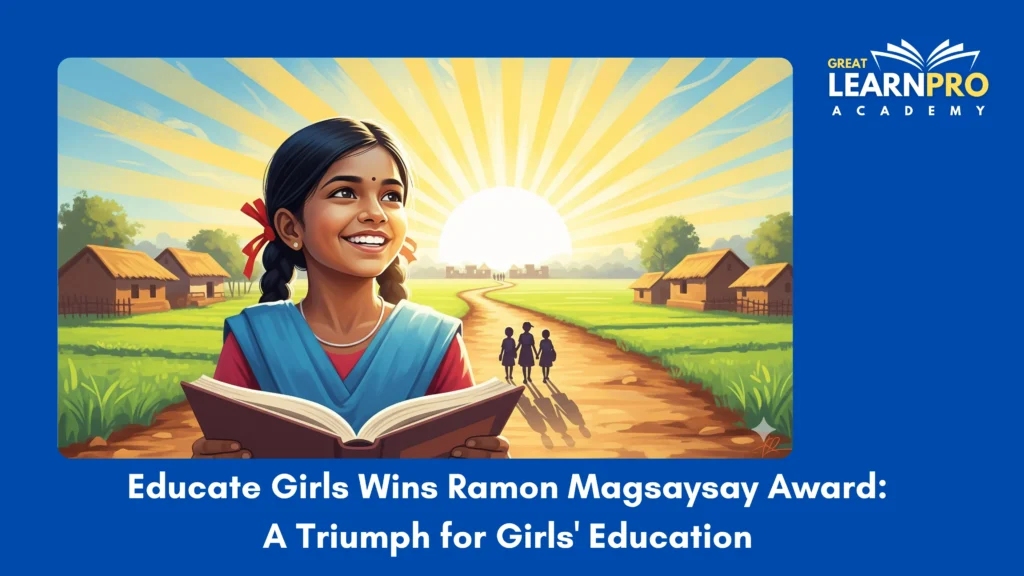
Introduction
The Ramon Magsaysay Award, often regarded as Asia’s highest honor and popularly called the “Asian Nobel Prize,” celebrates extraordinary individuals and organizations that bring transformative change to society. While the award’s legacy dates back to 1957, its relevance continues to grow as it highlights initiatives addressing deep-rooted social challenges. This year, India’s Educate Girls, a non-profit organization dedicated to bridging gender gaps in education, was recognized for its pioneering work in ensuring that every girl child has access to quality schooling.
The Ramon Magsaysay Award: A Brief Context
Named after the third President of the Philippines, Ramon Magsaysay, the award honors those who demonstrate integrity, courage, and service in fields that uplift humanity. Over the years, it has celebrated social reformers, rights activists, community leaders, and grassroots organizations across Asia. For India, the award has carried symbolic significance, having previously honored leaders like Vinoba Bhave, Jayaprakash Narayan, and Aruna Roy. Educate Girls’ recognition further strengthens this legacy by drawing attention to the critical issue of gender inequality in education.
About Educate Girls
Founded in 2007 by Safeena Husain, Educate Girls began with a simple yet powerful vision: to ensure that girls from the most marginalized communities in India could access schooling and equal learning opportunities. The organization operates in some of the country’s most educationally backward regions, where entrenched patriarchy, poverty, and social customs often keep girls out of classrooms.
Educate Girls adopts a community-based, scalable model to tackle these barriers. By working closely with local governments, panchayats, schools, and volunteers, the organization has developed systems to identify out-of-school girls, mobilize families, and improve the quality of education within government schools. Their focus extends beyond enrollment; they also emphasize retention, learning outcomes, and leadership building among young girls.
The Journey Toward Impact
One of Educate Girls’ key innovations is the Team Balika model, a cadre of trained community volunteers who work door-to-door in villages to identify out-of-school girls. These volunteers not only convince families about the importance of sending their daughters to school but also track progress and provide support to ensure continuity. This decentralized and community-driven approach has been critical in shifting local mindsets.
Since its inception, Educate Girls has directly impacted the lives of 1.4 million girls and improved learning outcomes for over 11 million children across Rajasthan, Madhya Pradesh, and Uttar Pradesh. The organization’s success lies in its ability to integrate data-driven methods with grassroots mobilization. Through technology-enabled surveys and partnerships, they ensure that no girl is left behind.
Why Educate Girls Won the Ramon Magsaysay Award
The Ramon Magsaysay Foundation recognized Educate Girls for its innovative blend of community engagement, systemic reform, and grassroots empowerment. The award citation noted how the organization has shown that sustainable change is possible when local communities are made stakeholders in the process of social transformation.
The recognition also highlights how Educate Girls has gone beyond traditional NGO models by aligning itself with UN Sustainable Development Goals (SDGs), particularly SDG 4 (Quality Education) and SDG 5 (Gender Equality). Their focus on ensuring foundational literacy and numeracy skills, alongside school enrollment, reflects a holistic understanding of education as both a right and a tool for empowerment.
Broader Implications for India
India continues to grapple with significant gender gaps in education, particularly in rural and tribal belts. Despite improvements in enrollment figures, dropout rates for girls remain disproportionately high due to factors such as child marriage, domestic responsibilities, and lack of safe infrastructure. Educate Girls’ model, which directly addresses these issues through community persuasion, systemic support, and policy alignment, offers a replicable blueprint for other regions and nations facing similar challenges.
Moreover, the award has placed global spotlight on India’s grassroots innovation in tackling social issues. At a time when educational disruptions due to the pandemic widened inequities, organizations like Educate Girls underscore the importance of localized, resilient approaches.
Recognition as a Catalyst for the Future
Receiving the Ramon Magsaysay Award is more than an honor for Educate Girls; it is a validation of grassroots-led systemic reform. It also creates momentum for the organization to scale its impact further, expand into more underserved regions, and influence national-level educational policies. Importantly, it reinforces the narrative that empowering girls through education is one of the most effective strategies for achieving social and economic transformation.
Conclusion
The Ramon Magsaysay Award has once again spotlighted a cause of immense relevance girls’ education in India. Educate Girls’ recognition is not just a celebration of an organization’s achievements but a call to action for society at large. It reminds us that bridging the gender gap in education is not merely a developmental goal but a moral imperative. By empowering young girls with the tool of education, Educate Girls is nurturing a generation capable of breaking cycles of poverty, inequality, and exclusion.
Sources
- https://indianexpress.com/article/india/educate-girls-ramon-magsaysay-award-2025
- https://www.thehindu.com/news/national/educate-girls-magsaysay-award-2025
- https://www.bbc.com/news/world-asia-india-education-girls
More Current affairs: https://learnproacademy.in/updates/
